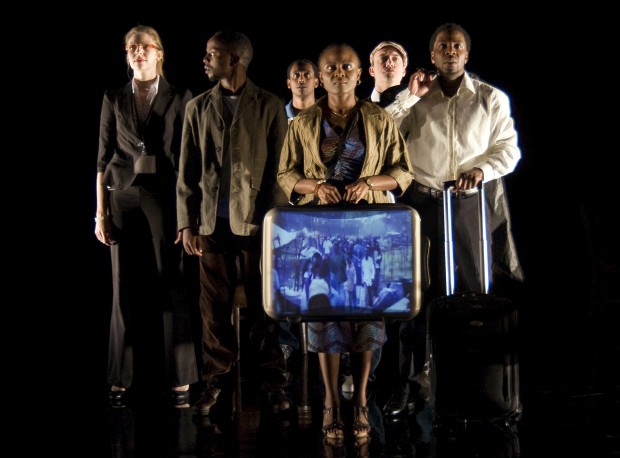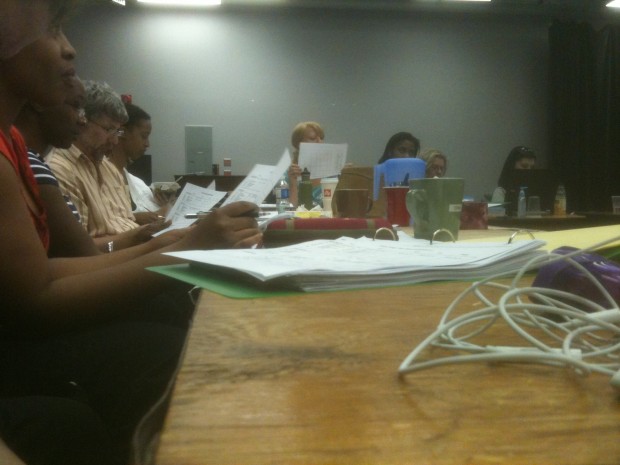Volcano’s Africa Trilogy: Part XII

(l-r) Maev Beaty, Muoi Nene, Araya Mengesha, Dorothy Atabong, Trey Lyford and Milton Barnes in Glo by Christina Anderson directed by Josette Bushell-Mingo
If I promise to incorporate “World Class City” into my lexicon can we keep making shows like this?
by Michael Wheeler
I have been working on this show for a long time.
I started in late 2008 as Artistic Producer in Training with Volcano – and then later as Assistant Director of Peggy Pickit Sees The Face of God by Roland Schimmelpfennig and Social Media Coordinator for the whole Trilogy. These different roles have afforded me a really broad perspective on a how a major international collaboration comes together – in the office, the rehearsal studio, and in the theatre. Thanks Theatre Ontario.
It has been a wild ride – I don’t think anyone involved in the show would argue it’s been an easy process. Ethically, theatrically, collaboratively, creating three new works of theatre that all deal with the contemporary nature of the relationship between Africa and the West has been a challenge that has pushed some top international and domestic artists to reanalyze themselves and their process. There have been few simple questions – so along with that has come complicated answers. From dramaturgy, to casting, to design, to scheduling, to marketing, to ensuring three separate works are having a contemporary conversation with each other – virtually every decision had to be made weighing the consideration of a huge number of factors.

Nothing will melt your mind faster than a production meeting with three directors, three assistant directors, six designers, four stage managers and two production managers.
Sipping my morning coffee on Opening Night Day it has really hit me how much I’ve learned from this process and how much I’m willing to stand behind this production. I am a much more knowledgeable artist because of it and I want to continue to be involved in projects like it: productions that combine top international artists with the best from Canada. I have a track record of being heavily critical of Luminato in the past – specifically because of the lack of opportunity the festival initially held for Canadian artists – and frankly it seems a little strange to be a physical embodiment of a change I was arguing for, but I’ll take it.
The words “World Class” and “City” get thrown around a lot here. It might even be fair to say we are unhealthily obsessed with whether or not Toronto and these words have a positive relationship. Certainly Luminato was born out of the sense it could contribute to this definition. Separate from whether the critics deem this show a hit or a miss in the days to come – shows like The Africa Trilogy are most likely to put Toronto on the map in terms of international culture. If we really want to play with the big boys and girls on the world stage it requires these kinds of resources both financially and in terms of the people we can attract to work with us. The surest way to become “World Class” is to make shows WITH other World Class artists.
If you haven’t been over to The Africa Trilogy blog yet, let me take this opportunity to invite you over to learn more about the show, the people who created it, and the ideas it has been addressing. There are a number of great posts by various authors with vastly different roles in the production including new content by inFORMING CONTENT Workshop Leader Deborah Pearson on the challenges of making socially relevant theatre, Lucky Ejim on being an actor who tells African stories in the West, and Mark Sealy on the contemporary representation of Africa through visual images.
Here’s to an awesome opening night for The Africa Trilogy and the many other Africa Trilogy-like projects to come.


Hey Michael,
Have a great opening and thanks for the nod to Theatre Ontario.
Interesting that a successful Africa Trilogy has now become more critical to Luminato after the disaster that Malkovich’s Infernal Comedy was (I saw it) and today I see a bad review of Wainwright’s Prima Donna in the Star.